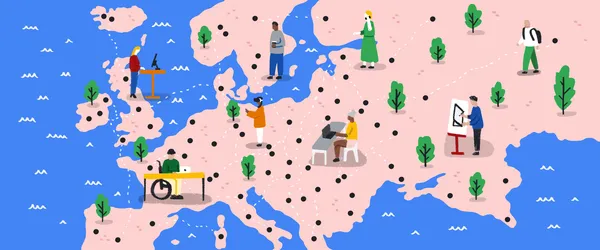Projects selected for funding across Europe
The Centre for Sustainable Energy plans to establish an open-source, city-wide energy dataset in Birmingham, England. The team will also develop analysis tools that can model decarbonisation options for buildings in the city, overlay and integrate public datasets, and aggregate granular socioeconomic data.
With these tools, the Centre hopes to develop city-wide interventions and smaller community initiatives that will help the city reach its overall decarbonisation goals. “By combining emissions data for buildings, transport, and energy infrastructure with socioeconomic data, and distributing local community grants, we’ll be able to help residents deliver targeted carbon reduction projects, and support the City Council and Route to Zero Task Force to deliver their city-wide climate emergency ambitions,” said Rachel Coxcoon, Programme Director at the Centre for Sustainable Energy.
In Hamburg, the CityScienceLab of the HafenCity University will develop a tool incorporating data from Google’s Environmental Insights Explorer (EIE), Hamburg’s urban data platform and other sources. With this tool, they plan to help the city identify areas that can be used as “urban testbeds” for prototyping energy innovations in the Altona, Norg and Bergedorf districts. The prototyping process will help visualise and simulate projects to better understand their projected impact on the city.
Other Action Fund grantees and their projects include:
- Deutsche Umwelthilfe in Berlin: To help the city reach its air quality and carbon-free transport goals, they plan to analyze data about air quality, noise levels and traffic, and use EIE to advocate for data-driven changes to cycling and other transportation infrastructure.
- Carbon Co-Op in Greater Manchester: Working with local partners, they'll develop multi-sector energy plans for the regions and pilot three citizen-led projects focused on sustainable mobility and energy-efficient buildings. A newly developed urban energy dashboard will help them track impact.
- Miljopunkt Amager in Copenhagen: Using Google Air View, traffic data and community-collected data, they’ll test new urban space designs that may improve air quality.
- Air Pays de la Loire in Nantes: Using real-time air quality datasets that account for traffic conditions, they will provide citizens and local authorities with tools to make decisions about transportation management and traffic regulation systems.
The latest insights from cities taking data-driven climate action
Through these projects, we’ve seen how cities are thinking about data-backed sustainability planning and action. So far, we’ve seen trends that can be applied globally.
First, starting small can lead to a big impact—especially when it comes to data. City-level data can point decision-makers in the right direction, while neighborhood or district data can create the necessary community buy-in for more specific programs or interventions. Second, actionable data can help citizens make informed day-to-day decisions and take action. After all, informed citizens are a critical piece of the puzzle. Last, we saw a huge interest in cities looking to improve air quality through more efficient and low-carbon transportation options.
To have a meaningful impact on climate change, data-driven approaches must be scaled across the globe. That’s why Google.org provided ICLEI’s Global Secretariat with additional funding to develop case studies so they can share best practices that emerge from the Action Fund with cities around the world that are looking to implement similar data-driven climate interventions.
One of our goals at Google is to unlock climate ambitions with data, insights, and innovation to overcome today’s climate crisis. We’re excited to continue supporting leading organizations, such as ICLEI, and cities that share that goal.
 Google is providing new support for the Auschwitz-Birkenau State Museum and Foundation on the 80th anniversary of the liberation of the Nazi concentration and exterminat…
Google is providing new support for the Auschwitz-Birkenau State Museum and Foundation on the 80th anniversary of the liberation of the Nazi concentration and exterminat…
 Google is providing new support for the Auschwitz-Birkenau State Museum and Foundation on the 80th anniversary of the liberation of the Nazi concentration and exterminat…
Google is providing new support for the Auschwitz-Birkenau State Museum and Foundation on the 80th anniversary of the liberation of the Nazi concentration and exterminat…
 Google.org announced the 80 organizations that will receive funding and support from the AI Opportunity Fund: Europe to help 20,000 people learn AI skills.
Google.org announced the 80 organizations that will receive funding and support from the AI Opportunity Fund: Europe to help 20,000 people learn AI skills.
 Google.org is committing €9M to teach, inspire, and engage even more young people around the world in the subject of AI.
Google.org is committing €9M to teach, inspire, and engage even more young people around the world in the subject of AI.
 By providing €10 million in funding, as well as mentoring and support, we’re helping entrepreneurs from underserved backgrounds develop transformative AI-solutions
By providing €10 million in funding, as well as mentoring and support, we’re helping entrepreneurs from underserved backgrounds develop transformative AI-solutions

